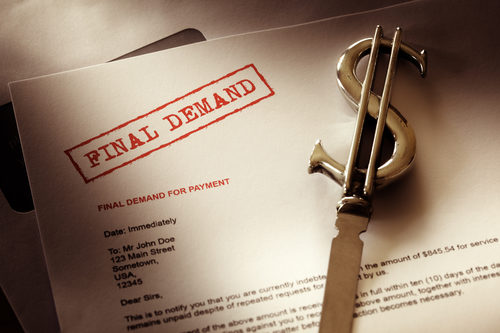Debt Relief Options and Benefits
Sticking to a budget is hard enough without having to deal with today’s soaring inflation and a large amount of debt.
Debt not only affects your financial stability, but it can also hurt your emotional and physical health. Here are a few ways that you might be struggling with debt:
Debt and Mental Health
- You and your spouse or partner constantly fight over money
- You feel emotionally drained because so much of your paycheck is going to pay interest and fees, and you don’t envision your balances ever going down
- You are stressed out and losing sleep due to your debts as you’re forced to take cash advances to pay ordinary bills like utilities
- You have been skipping the payments on some bills to pay others
- You have almost completely drained your savings just to get by
- You are suffering the anxiety of creditors who are hassling you about overdue bills
- You feel awful because you’ve maxed out the limits on most of your credit cards
- You have lost all hope that you will ever be debt-free
Debt and Physical Health
- Nausea
- Indigestion
- Colds and sinus infections
- Fibromyalgia
- Arthritis
- High blood pressure
- Heart disease
- Headaches
Wouldn’t it feel great if you could get your debt issues resolved? Imagine if these financial headaches and frustrations were behind you and you could live your best life again – on your terms.
No matter what led you to juggle a large amount of debt, there are many ways to relieve your burden, achieve debt relief and take back financial control.
Debt relief refers to a variety of strategies that make it easier for the borrower to repay what they owe. Not all debt relief is the same, and your best solution depends on the type of debt you’re carrying and what you need help with most.
What Are The Options and Benefits of Debt Relief
Debt relief, also known as debt negotiation, has helped hundreds of thousands of people pay a lump sum that is less than the amount they owe.
If debt relief suits your financial situation, an expert will negotiate on your behalf with creditors to reduce your amount of debt. The next step is to set up affordable monthly payments for you to pay off the rest. You could see your accounts resolved in as little as 24-48 months by using this method. If you don’t have an income and can’t save money, you won’t qualify for debt relief. But don’t worry, there are other options to consider.
Bankruptcy
Bankruptcy provides important protection for consumers who find themselves drowning in debt. But while a sizable amount will be wiped out whether you file for Chapter 7 or Chapter 11 bankruptcy, it’s not an easy way out. There will be a stain on your credit reports for 10 years and in your personal file for the rest of your life. A chapter 7 bankruptcy would likely lower your credit score substantially and make it nearly impossible for you to get any new credit for 2 to 3 years. When you can get credit again, it will be low-money and high-interest.
Self-Payment initiative
This type of debt relief provides the option for you to try fixing everything yourself. It’s not easy, but it can save you time and money. While you won’t be burdened with the additional costs that come with hiring someone to help you, the odds of paying off your debt are against you given your financial history. To start off, you need a plan that shows how much debt you owe and your ability to pay it off. The easiest way to do this is by creating a spreadsheet, which you can find for free on Google Docs. Create four columns and include the name of the creditor, the amount owed, your minimum payment (if applicable) and the payment due date. This provides a good picture of your debt, which is the important first step in getting it under control.
The next step is to call creditors to demonstrate your difficult financial situation. Be prepared to show documentation that proves your claims are valid. If you can convince creditors that you’re suffering a financial hardship, you can then discuss the possible options that would permit you to meet your debt obligations.
There are three other popular options that you could discuss with your creditors:
- Have your interest rates reduced for much lower monthly payments, which could make it possible for you to meet your debt obligations
- Discuss a timeout period of two or three month during which time you would no longer be responsible for payments. This gives you time to get your finances reorganized and to save money that might allow you to catch up on your payments
- Have some or all of your credit cards converted into repayment programs. You’d likely be required to give up your credit cards. But in turn you’d have fixed payments for a fixed amount of time. In the end, you’d be completely debt-free.
Credit counseling
This debt relief option simplifies your repayment process, making it easier to pay off your debt. When you contact an agency via a website or in person, a counselor will spend from 45 minutes to an hour discussing your finances – often at no cost.
If your debt is substantial, the counselor may recommend a debt management plan (DMP). In this scenario, your counselor will determine how much you can pay and then negotiate with creditors on your behalf. The negotiation can be for longer terms, lower monthly payments determined by what you can afford to make or a reduction in interest rates.
If most of your creditors agree to your debt management plan, you stop paying them immediately. Instead, you would send one monthly payment to the credit-counseling agency, which would distribute the money to creditors per your mutual agreement. The downside is that it typically takes five years to complete, you’d probably be required to give up the credit cards not in your plan and you’d be strongly urged to not take on any new credit until you’ve paid off your debt.
The benefit of this type of debt relief is that your monthly payment will most likely be much lower than the amounts you are currently making. You may also have any penalty charges and fees waived. Best of all, you’ll no longer be harassed by your creditors since everything will be handled through the debt management agency.
Debt consolidation
Debt consolidation offers the option to combine your debt into one manageable account. It eliminates the higher interest rate debt and enables you to make one affordable monthly payment. However, this does nothing to lower your monthly balance. All you’ll be doing is shifting your debts into just one account by getting a loan from a bank, credit union or some other source of funds.
If you’re a homeowner and have equity, you could probably take out a home equity loan or homeowner equity line of credit and use the funds to pay off your other debts. These are called secured loans or second mortgages because you’re required to use the equity in your home as collateral. Whichever you choose, you’ll end up with a much lower monthly payment than the sum you’ve been making.
If you don’t have equity, you still might be able to get an unsecured or personal loan. This type of loan provides a lower monthly payment but not as low as the amount you would get by offering collateral to offset your lender’s risk. The upside of this loan is it eliminates the harassment of creditors and collection agencies. The downside is that it could take 30 years to repay versus 7 to 10 years for a home equity loan. In either case, you’ll pay more interest in the long run.
Debt relief isn’t a one-size fits all solution. So, before going over your options, see if you qualify to enroll in a debt relief program.
You might want to consider debt relief if:
- You’re paying just the minimum on your credit card bills or other loan payments
- You’re still up to date on your bills, but you’re living paycheck to paycheck
- You’ve tried to cut down your debt by yourself, but it’s not working and you need help
- You’re so overwhelmed, you’ve considered drastic solutions like bankruptcy
If you’re eligible for debt relief and decide it’s your best solution, the next step is finding a debt relief company and learning about how their debt relief program works.
Before you choose one, do your homework. Ask yourself what it will do for you and if it’s legitimate. One of the quickest ways to spot a scam is if the company requests fees upfront, which is illegal. Look for a company that only charges a fee after it has successfully settled some of your debts.
A reputable and honest debt settlement company will:
- Have at least an A rating with the Better Business Bureau
- Be in business for more than five years
- Belong to the American Fair Credit Council, the watchdog of the debt settlement industry
Have many online reviews, with the majority of them favorable - Rank highly on review sites such as Top Consumer Reviews, Best Debt Companies and Debt Settlement Review 2021/Best Debt Relief Services
- Have proven results
Just as important, a trustworthy company will operate transparently. Once you’ve signed up, you should be involved in every step of the settlement process. A friendly and knowledgeable debt counselor will lead you through the process from signing the agreement to the moment you’re completely debt-free.
You can expect this and more from National Debt Relief—the company that has helped hundreds of thousands of people pay off their debt, gain financial stability and get their life back.
Once you qualify for debt settlement, National Debt Relief will provide you with an agreement that spells out exactly what the company will do for you, what will be required from you and the cost of services. As soon as you sign the agreement, you’ll no longer be required to pay your creditors. Instead, National Debt Relief will deposit the money you send them into an escrow account that only you can control.
When National Debt Relief settles one of your debts, your dedicated expert will contact you and ask that you release the funds to pay the settlement. They never use your escrow account money to pay your fee. In fact, clients aren’t charged until all of your debt has been settled.
Your initial, no-obligation consultation is free. Call to work with them on finding the right solution for your financial situation and comfort level. Isn’t it time to work towards a better life that’s debt-free?
By working with National Debt Relief, you will:
- Get financial counseling and guidance from experts
- Create a budget plan that addresses your problematic spending pattern
- Have a lower monthly payment that’s affordable for your tight budget
- Get payment charges and fees waiveds
- Have a sizable portion of your debt forgiven
- Focus on one monthly payment that funds your FDIC-insured account, which is what National Debt Relief will use to pay off your debts
- Settle your debts without compromising your other basic financial obligations
- Live a less stressful life as you pay off your debt in less time and with the most savings
Call today for your free, no-obligation consultation and pay off your debt with the debt settlement plan you can live with:
- Affordable monthly payments
- Pay off your debt in as little as 24-48 months
- Established relationships with over 10,000 creditors
- Can forgive almost half of the amount you owe or more
- Can help your credit score bounce back
- Expert support and advice
- Accredited with the Better Business Bureau
- Top-rated client reviews

Something really exciting happens after people have their first phone call with us.
They start to feel the power of taking back control of their personal and professional life.
Pay off your credit card debt
- Receive A Free Savings Estimate Today
- See How Quickly You Can Be Debt Free
- No Fees Until Your Accounts Are Settled







